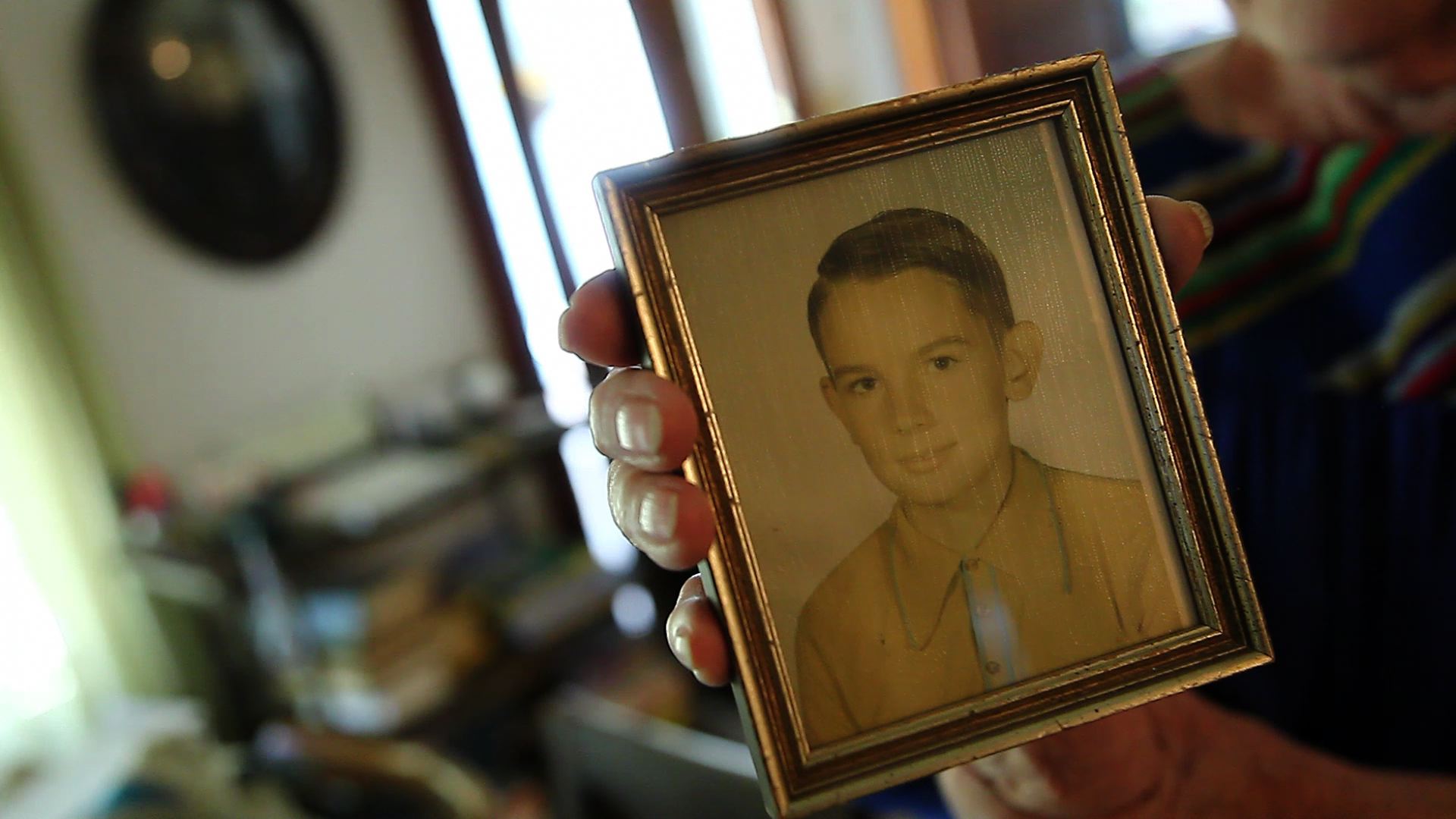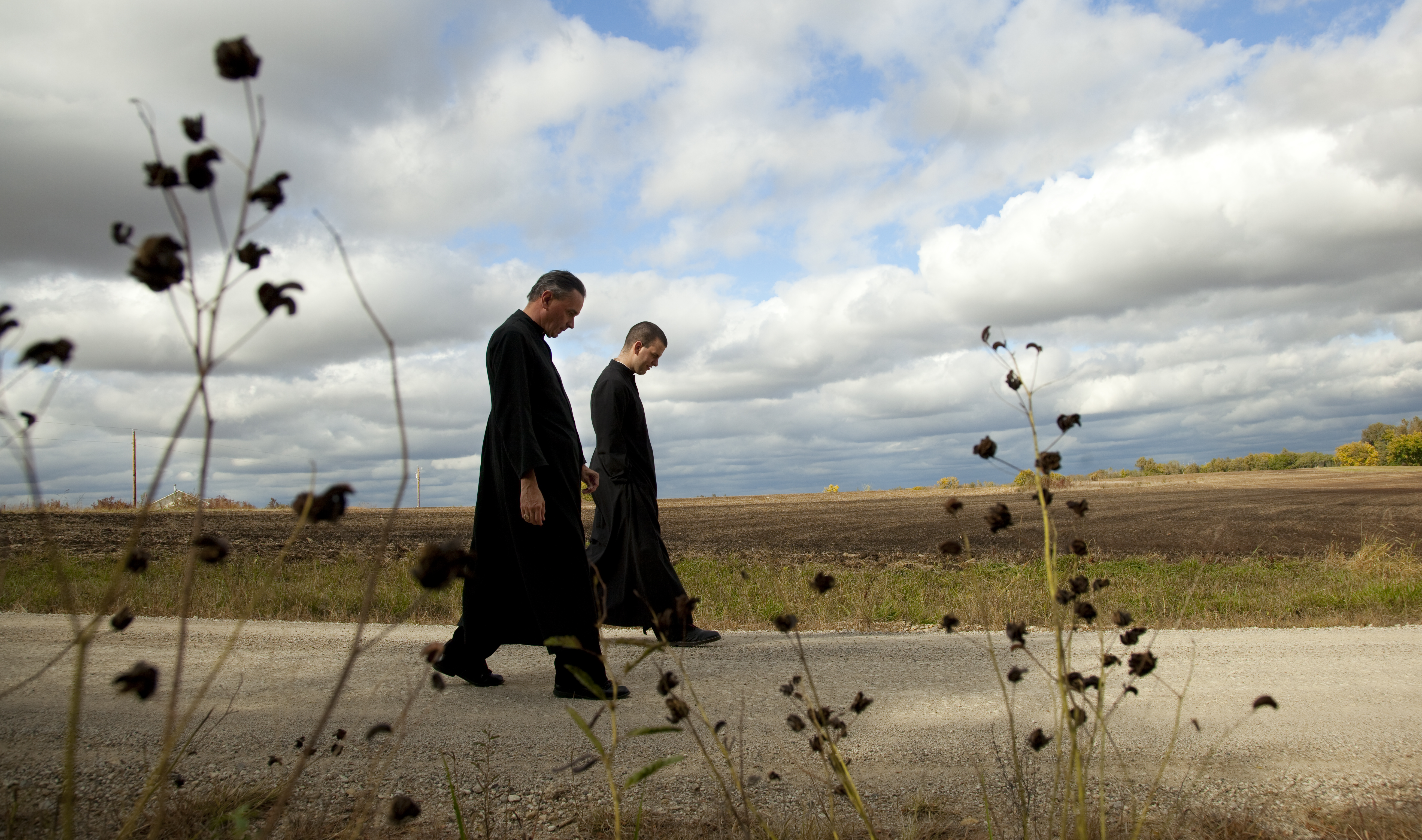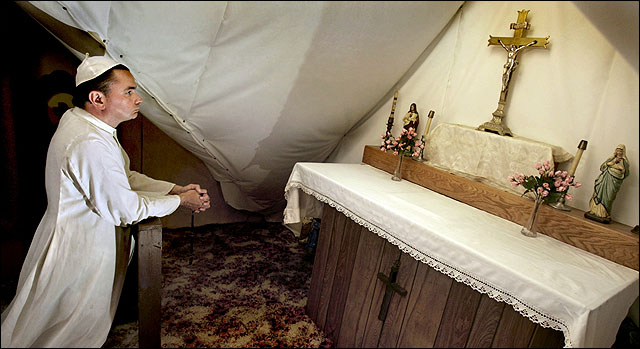The gospel of Pope Michael: Kansan stakes own claim to Catholic Church

Pope Michael, also known as David Bawden, is pictured outside his farmhouse in Delia with his mother, Clara “Tickie” Bawden, and Phil Friedl, a seminarian living and studying with him. In 1990, six family members and followers elected Bawden pope of the Catholic faith after recognizing personal differences with Church doctrine.

Tickie Bawden shows a photo of her son, David, as a child..

David Bawden and seminarian Phil Friedl walk the country road to the farmhouse.

David Bawden, who has taken the name Pope Michael I, prays in a chapel in the attic of his home near Delia. Bawden has claimed to be the rightful leader of the Catholic Church since he was elected by a handful of traditionalist Catholics in 1990.
Papal Audience
Who: Presentation by David Bawden, aka Pope Michael.
Where: Big 12 Room, Kansas Union, Kansas University.
When: 7 p.m. Monday.
Admission: Free and open to the public.
The pope drives a pickup truck. Sometimes, a four-door Subaru.
He likes his barbecue charcoaled-rare and smothered in sauce. Books are a passion — he has more than 6,000 — as is “Jeopardy!,” and he makes a mean spaghetti sauce.
On Sunday, like every day, he prays in his in-house chapel, but not even his backing can bring his beloved Kansas City Chiefs a winning season.
Of course, those games aren’t broadcast in Rome. But they do make their way to a small blue farmhouse on 5 acres decidedly closer: Delia, population 178, just northwest of Topeka.
There, you’ll find Pope Michael I.
Sitting on an antique couch with his mother by his side, he’ll tell you he’s the successor to Pope Pius XII. He believes the church known around the world as the Roman Catholic Church — called the “Novus Ordo” in his home — has been led by antipopes since Pius XII’s death in 1958.
So, for the past two decades, Pope Michael, 50, has preached his brand of Catholicism from the family home he shares with his mother, Clara “Tickie” Bawden. Also making the Vatican home is a seminarian, 22-year-old Phil Friedl who was a toddler when Pope Michael, born David Bawden, was elected pope July 16, 1990, in Belvue by a group of six laypeople.
If you haven’t heard of Pope Michael or his church, it’s not for his lack of trying. He runs his own Web site, www.vaticaninexile.com. He’s hosted a documentary film crew in his home for a forthcoming movie, and he tweets and replies to fans on Facebook.
He plans to explain his views at 7 p.m. Monday at the Kansas Union’s Big 12 Room, where he’ll be a guest of Kansas University’s religious studies department. He knows he’ll get laughter and maybe strange looks because of his papal dress. But he doesn’t care because, as his mother says, this is serious business.
“Your soul — where you’re going to spend eternity — it’s contingent on what we do during this life,” says Tickie Bawden, 81. “And whenever I think of eternity, my head just spins. It’s forever.”
‘Betrayed’ by the church
The transition from David Bawden to Pope Michael began in elementary school, when the Second Vatican Council hit conservative Catholics such as the Bawdens like an atomic bomb.
The reforms Vatican II was pushing in the early 1960s were and are something the family views as heresy. Not only did the council do away with the old-style Latin Mass, but it also allowed more latitude to other forms of religion as well as tweaked the wording in a crucial piece of doctrine.
“The earlier Mass, the old Latin Mass, said that ‘Christ’s blood was shed for many for the remission of sins,’ and they changed that to ‘Christ’s blood was shed for all,'” says Tim Miller, a KU professor of religious studies. “And that could imply that the sacrifice of Christ would cause everyone to be saved, everyone to achieve salvation, whereas the classic idea has been that only believers are going to be saved and everyone else will be damned. Some conservatives said, ‘That’s a terrible idea. People who are in horrible error are going to be saved?'”
Among those outraged were Tickie and Kennett Bawden, who were raising their sons, David and Brian, in the Catholic faith in Oklahoma City. A devout family — Tickie’s sister even became a nun — the church’s attempt at change left them feeling in the cold.
“If everyone is saved, then why be good?” Tickie Bawden says.
In response to what the family saw as a betrayal by the church, the Bawdens became interested in the traditionalist movement of the Society of St. Pius X. Pope Michael even attended the society’s seminary in Armada, Mich., in 1978 before being dismissed amid what he calls “infighting” within the society. (A person answering the phone at the society’s headquarters refused to comment for this story.)
Despite the dismissal, the family moved to St. Marys in the early 1980s to be closer to the society, and Pope Michael decided to take his religious education into his own hands.
“I started just buying books, put myself in the hands of the Holy Ghost and just started studying,” he says.
By the mid-1980s, the Bawdens, now broken off from the society, believed there should be a papal election and sought out others who felt the same way. On July 16, 1990, a group of six people — the Bawdens and three followers –in Belvue elected David Bawden to the papacy. The easiest part, it turned out, was taking the name Pope Michael, an homage to his religious hero and storied protector of the good, the archangel Michael. The hardest part came to him soon after.
“(It) hit me on the drive back from where the election was in Belvue back to St. Marys,” Pope Michael says. “We’re about halfway back, and I realized I’m now responsible for six billion souls on earth.”
Fighting the tide
Going against such a powerful tide as the Roman Catholic Church is no easy task. Funding a church is hard to do when your estimated membership roll caps off at 50.
Tickie Bawden disputes that number, saying that in her view, “If you want to count numbers, everyone in heaven and purgatory is with us.”
The family keeps the church running solely on savings, donations and odd jobs the pope does from time to time. As part of his duties, Pope Michael maintains his own Web site — blogging, putting up video and sending out newsletters — builds his own computers and works on the interior of a seminary building attached to the farmhouse in 2000. Right now, Friedl is the only seminarian, but he is making it his goal to bring Pope Michael’s church to as many followers as possible once he is ordained. It’s a dream the former engineering student’s family in Chicago doesn’t understand.
“There comes to a point where you can’t willfully remain ignorant, especially when you’re this close to the truth,” Friedl says. “They won’t even listen. That’s the frustrating part.”
Frustrated for a different reason is Teresa Stanfill Benns, who is one who wishes David Bawden would just leave it alone. A former follower, she attended and promoted his election, even writing a book with him, “Will the Catholic Church Survive the Twentieth Century?” before election day.
She broke away from Pope Michael two years ago and publicly denounces him in a list of antipopes on her Web site, www.betrayedcatholics.com. (Among the other antipopes on her list are several other self-elected popes, including Linus II, aka Victor von Pentz, and Peter II, aka Lucien Pulvermacher, as well as every Roman pope after Pius XII.)
“I believe he has resorted to promoting a personality cult in order to divert the attention of his followers from the fact that he has deviated from doctrine,” Benns says. “This is something that he accused traditionalists — such as the Society of Pope St. Pius X, which he belonged to during the 1970s-’80s — of doing for years. He may consider himself a pope, but he is not pope of the Catholic Church.”
And what does Pope Michael say to his critics, including those who will surely show up on Monday night at KU?
“Usually, I’ll address whatever their point is,” he says. “It’s rare that I have to write a police report — where they offer to cut out my tongue and ship it to John Paul II — which, I did have somebody do that. I did file a police report.”
Not that he believes John Paul II would have gotten his tongue if the critic had actually succeeded — Pope Michael has been waiting for word from Rome ever since he sent John Paul II a letter of excommunication while he was alive.
“I didn’t expect a response,” he says. “John Paul II probably didn’t get my letter, but someone did. If they had a true concern about souls, they would reply, even if they think, ‘This guy’s a fool.’ I mean, fools have souls, too.”
Catholic history led to Bawden’s election
The circumstances that led David Bawden to be elected Pope Michael are complicated, but they began in the sedevacantist movement.
The movement began after the death of Pope Pius XII in 1958. The next two popes, John XXIII and Paul VI, oversaw Vatican II, a council that instituted changes in the church, including what some say is an adjustment in how salvation is perceived.
Because of these changes, groups began to break from the church, believing the differences were in error. These groups believed the papacy must be filled by an antipope because a true pope would not make such changes.
Tim Miller, a Kansas University professor of religious studies, says relatively few of the Catholic church’s critics are true sedevacantists. The term literally means “the seat is vacant.”
The Bawdens say their point is proven by the church’s more recent problems, including the child molestation scandal and the shortage of candidates for the priesthood and women becoming nuns.
But Carroll Macke, communications and planning director for the Archdiocese of Kansas City in Kansas, says whatever the disagreement, not just anyone can form a committee and elect a pope.
“There’s a process for being elected president … the same as for pope,” Macke says. “Not everyone can run around saying, ‘I’m president of the United States.’ And the same way with being pope.”

